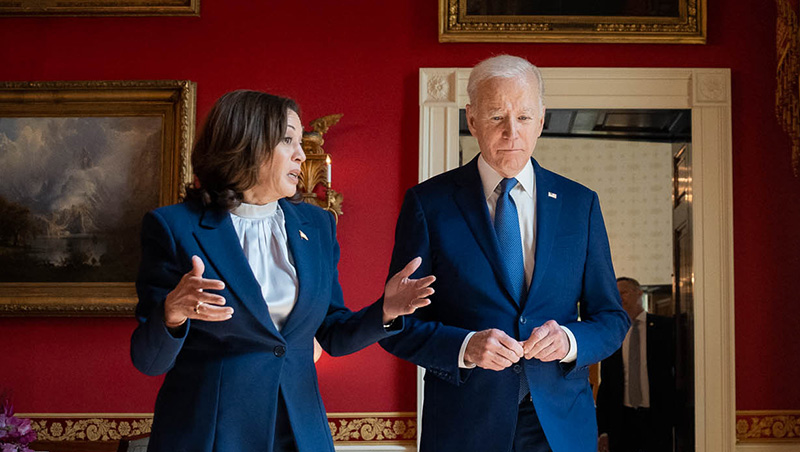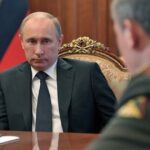Now Is the Moment for Kamala Harris to Ditch Biden on Gaza
Many on the left were elated when Vice President Kamala Harris announced on Tuesday that she had selected Tim Walz as her running mate, with progressives citing the Minnesota governor’s support for strong labor protections, climate solutions, and a cease-fire in Gaza. Yet if Israel pulls the United States into a war in the Middle East, the Democrats are almost certain to lose the election regardless of whom Harris selected.
Voters are tired of unnecessary wars. In November, Quinnipiac found that 84 percent of Americans feared being dragged into war in the Middle East. According to a new poll by the Chicago Council, a majority opposes sending U.S. troops to defend Israel. Yet there is a real danger of that happening, given the Biden administration’s unrelenting support for Netanyahu’s aggression toward Palestinians, Lebanon, and Iran. And Harris risks being branded a warmonger by association, while Trump portrays himself as the dealmaker who “started no new wars” during his term.
If the U.S. is at war in the Middle East, Harris may find herself in a similar position to Hillary Clinton, whose foreign policy hawkishness may have contributed to her loss in 2016. But Harris has a chance to chart a different path with the war-weary public. While Clinton’s pugnacious image reflected her core beliefs, Harris could choose to make clear that she’s opposed to unnecessary wars. She could show that she will not send U.S. soldiers to die so that Netanyahu can stay in power, thereby siding with the 72 percent of Israelis who want him to step down. And she could demonstrate that she will no longer subsidize a military that is intentionally killing women and children, according to Israel Defense Forces whistleblowers.
While Americans are distracted by the veepstakes, the Middle East is facing an escalation of violence after Israeli attacks killed Hezbollah military chief Fuad Shukr in Beirut and Hamas political chief Ismail Haniyeh in Tehran within 12 hours last week. In a televised speech on Tuesday, Hezbollah Secretary General Hassan Nasrallah said that Netanyahu was seeking a broader war yet remained dependent on the U.S. to conduct it. Iran’s supreme leader, Ayatollah Ali Khamenei, stated that because the Israeli attack occurred on Iranian soil, avenging the death of Haniyeh was “Tehran’s duty.” Throughout Israel’s war in Gaza, Hezbollah and Iran had repeatedly avoided escalation, even in the face of provocations from Israel. But the assassinations of Haniyeh and Shukr appear to have finally pushed them too far.
Government officials across the Middle East have shuttled between capitals, hoping to prevent the worst. In a rare move, Jordan, a close U.S. partner, sent its foreign minister to Tehran to call for restraint, but newly inaugurated Iranian President Masoud Pezeshkian on Sunday called Israel’s attack a “major mistake” that “would not go unanswered.” Qatar, another U.S. partner, spoke with officials in the U.S., Egypt, and Jordan about how to de-escalate. According to a statement from Jordan’s Foreign Ministry, Jordanian Prime Minister Ayman Safadi and Qatari Prime Minister Mohammed bin Abdulrahman bin Jassim Al Thani agreed that the first step would be to end Israeli violence against Gaza. If Israel wished to defuse tensions, agreeing to a cease-fire would clearly do so.
Israel instead dropped more bombs on Gaza, including on several United Nations Relief and Works Agency schools serving as temporary shelters, in what the U.N. described as yet another violation of international humanitarian law: Israel bombed 17 UNRWA schools in the month of July. Israeli Finance Minister and right-wing extremist Bezalel Smotrich stated on Monday his desire to starve the two million people trapped inside Gaza to death. Israel then closed the Kerem Shalom border crossing, the only entry into southern Gaza. And Israel’s premier human rights organization, B’tselem, released a shocking report on the systematic rape and torture of Palestinians detained by Israel.
Many Americans are enraged by Biden’s blind support for Netanyahu and the war crimes that Israel is committing against Palestinians in Gaza. For those who oppose sending billions of dollars and weapons to Israel every year, Harris’s selection of Walz appeared preferable to some of the other contenders. Progressives dreaded the possibility of Pennsylvania Governor Josh Shapiro, who had condemned college students for protesting in support of Palestine, comparing them to the KKK. Some commentators opined that Shapiro may have been the first American politician to pay a price for being seen as too pro-Israel. But many advocates for Palestine remain skeptical that Harris and Walz, even though they’ve expressed more empathy for Palestinians than Biden has, will significantly alter U.S. policy.
Unless Harris signals clearly that she will no longer bankroll Israeli aggression against Palestinians and its regional neighbors, Netanyahu will continue to push the region toward war. He has been trying to provoke Hezbollah for months. Since October, Israel has launched 83 percent of all munitions across the Israeli-Lebanese border, with Hezbollah accounting for the other 17 percent. Israel’s attack on the Iranian consulate in Damascus in April prompted a carefully choreographed Iranian response that did little damage. By killing Shukr and Haniyeh, Netanyahu appears to be doing everything possible to provoke a large-scale retaliation.
If Hezbollah and Iran oblige Netanyahu, Biden’s past decisions suggest that he could commit U.S. troops on Israel’s behalf; the U.S. is already moving additional military assets into the region. U.S. troops on the ground would give Netanyahu exactly what he wants: America fighting a war to keep him in power, and Trump back in the White House. So if Harris and the Democrats want to win in November, they need to convince Biden to tell Netanyahu that the U.S. will not fight this war for him—and to put all additional security assistance on hold until the prime minister agrees to a full cease-fire in Gaza.
By: Annelle Sheline – a research fellow for the Middle East at the Quincy Institute and a nonresident fellow at the Arab Center. Before completing her Ph.D. in political science, she worked as a journalist in Egypt and Yemen.
Source: New Republic







